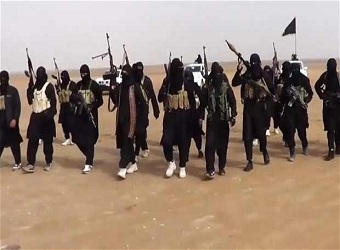Iraqi government forces have resumed their push towards western Mosul, the last major stronghold of so-called Islamic State (ISIS) in Iraq.
Artillery fire could be heard in the distance, reports the BBC’s Quentin Sommerville, who is embedded with government troops.
Launching the operation on Sunday, the army seized several villages.
The eastern part of the city was liberated from IS last month after heavy fighting.
On Monday, U.S. Defence Secretary James Mattis arrived in Baghdad on an unannounced visit.
He told reporters the US military was not in Iraq to seize anybody’s oil, seemingly to allay concerns after President Donald Trump last month said the U.S. should have kept the oil when it pulled troops out of Iraq in 2011.
Thousands of Iraqi troops, backed by artillery and air power, are involved in the assault to retake Mosul.
Their progress has been slowed down by huge improvised explosive devices planted by IS along the route of the offensive, our correspondent says.
Bomb disposal teams are being used to clear them.
In their assault, Iraqi soldiers have been using heavy weapons, including rocket missile launchers, correspondent added.
The BBC’s Quentin Sommerville is embedded with Iraqi forces as they advance on Mosul. He is tweeting updates as his convoy attempts to move forward:
04:15 GMT: Convoy halted by suspected roadside bomb – IS have planted huge improvised explosives devices along the route.
04:19 GMT: The EOD, or bomb disposal, team are attempting to safely detonate the device.
04:36 GMT: Bomb disposal team heading back to the suspected roadside bomb for a second time. It seems their controlled explosion hasn’t worked.
04:36 GMT: No bang. And we can proceed.
04:36 GMT: EOD team checking for secondary bombs.
04:36 GMT: This will be slow progress if it continues.
Iraqi forces have now all but surrounded the western part of Mosul.
Concern has been voiced by the UN about the welfare of civilians trapped in Mosul, amid reports that they could number up to 650,000.
Leaflets warning residents of an imminent offensive were earlier dropped over the west of the city.
Military officials said that the western side of the city, with its narrow, winding streets, may prove a bigger challenge than the east.
They say that western Mosul, although slightly smaller than the east, is more densely populated and includes districts that are seen as pro-ISIS.
All bridges from there to the west of the city, across the Tigris river, were destroyed.
The offensive against the eastern part of the city was launched on 17 October, more than two years after jihadists overran Mosul before seizing control of much of northern and western Iraq.
The UN said in late January that almost half of all the casualties in Mosul were civilians.
At least 1,096 have been killed and 694 injured across Nineveh province since the start of October.
Source: BBC
